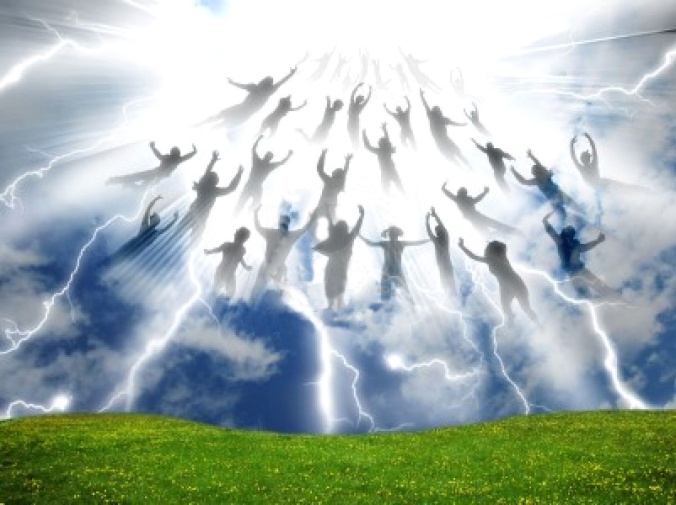Hola Everybody,
According to Marjorie Traitor Greene, the rapture was supposed to be upon us starting today, April 8th. It seems like the rapture is upon us, proving that conservative, fundamentalist Christians have been right all along. Now, don’t you feel like an idiot for not purchasing this Rapture Survival Backpack© — Ha!
Jesus is Gonna Kick yo Ass

Quick! Look busy — Jesus is coming.
Every once in a while (in the U.S. that means every day) a religious nut predicts the end times are upon us. Google “rapture” if you want the details. If you’re too lazy, I’ll explain…
Pretend you’re a big time Hollywood executive and I tried to pitch you the following story:
“Okay, let me start with some context. It’s the 21st century, but millions of people still believe in this invisible Super Ghost who lives somewhere way, way up in the sky somewhere. You see, he created everything, sees everything, knows everything, and knows everything that had ever happened and will happen. Think: a divine J. Edgar Hoover– a huge security camera in the sky.
The people who believe in him think of him as a magic helper who protects, punishes, and watches over them. It’s a take on the Santa Claus thingee: He sees you when you’re sleeping, He knows when you’re awake (and engaged in revolutionary activities), and so on.
Yet even though this ghost has, like, all the superpowers of all the superheroes rolled into one, he’s in actuality very insecure. He demands that you follow and pay tribute to him or else you get an eternity burning in a non-stop, super-duper fire, boiling in lava-like shit and being constantly stabbed by devils with pitchforks. Oh yeah! I almost forgot, two thousand years ago he sent his only son (which he conceived by Shtupping a married virgin) to earth in order to redeem humanity from their wickedness by getting him nailed to a cross (that whole Gospel According to Mel Gibson treatment).
Now, bear with me because this is where the story gets interesting: after two thousand years of watching humanity slaughter itself, getting really fucked up, and having wild orgies, and basically just slacking off, The Son plans to return to earth from outer space. But before he does, he’s going to beam up to Heaven all those people who have continued to have faith in him. Yup, levitate them right out of their clothes, wherever they are — on an airplane, asleep, having sex, on the toilet, and (get this!) from the freaking grave! That’s right, corpses and cadavers blasting out of the ground! Think: Saw meets Night of the Living Dead, with some touches of Superman and Terminator thrown in.
Meanwhile, the people left behind are freaking out. I mean, imagine you’re on an airplane to South Beach for a weekend of debauchery and suddenly the pilot fuckin’ disappears! Flies right by your window!
Dang!
Then you look and you see hundreds of naked people whooshing by (of course, we’ll make them up to be gorgeous-size zero-big-breasted-no ass-having-blonde-white-babes and maybe throw in an old dude just for laughs). And then the plane just nose dives, crashes smack into the side of a mountain. Families are broken up and companies have to close because, like, the entire sales department just flew through the AC vents out the window!
Meanwhile, the people left behind are in a mass panic and MSNBC-CNN-FOX is blaming it on woke Black and Latino people, DEI, the Muslims, and the liberals. An orange-tinged former president is pissed because he thinks it’s some secret pentagon weapon he wasn’t informed about. Cut to a religious secretary as she tells him, ‘Mr. President, it’s the Rapture.’ Since he’s secretly a Hitler-loving groupie narcissistic fascist who’s never read the Bible, he’s never heard of the Rapture. The secret service sweeps him away to an undisclosed location where they fill him in on the details.
And this is just the first seven minutes! In the rest of the movie, the people left behind are going to suffer a seven-year nightmare of wars, plagues, attacks from supernatural creatures, asteroid collisions, and rivers of blood… ”
Would you buy a pitch like that? Well, considering the really inferior crap that gets produced these days, maybe a studio would produce such a story. Wait… you mean they made that movie?! Damn! LOL
Seriously, if I insisted that I actually believed the story to be true, most of you would have probably called security and have me kicked to the curb or shot by a posse of Colin Kaepernick-hating cops, right? Right? Right?
As many as a hundred million Americans admit that they believe in this story, which is known as the Rapture, a scene lifted out of the last book of the Bible. Yeah, that part, the crazy, hallucinogenic part. The part with the Apocalypse and its Four Horsemen, the Whore of Babylon, a seven-headed dragon, and crap that looks straight out of a badly crafted segment of Lord of the Rings.
It’s hey-Zeus (!) on steroids come back to kick some major Muslim (and Jewish, Atheist, and Wiccan, and… etc.) ass!
If you’re a Christian and never heard of the Rapture, then shame on you, you didn’t read the Bible all the way through to the end. In any case, this book isn’t for believers of the rapture. It’s for you, Heathen! Unbeliever! Doubter! Satanist! Secular Humanist Socialist liberal! If you’re curious about what 100 million of your neighbors find so compelling about the Rapture, then this book will do the trick. If, on the other hand, you’re the kind of person who values reason rather than myth, then this book will literally make you laugh your ass off.
Quick! Look Busy!
My name is Eddie and I’m in recovery from civilization…


